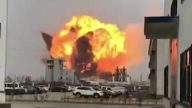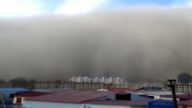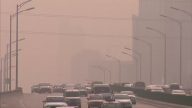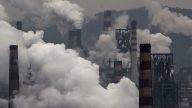【新唐人2014年04月28日訊】今年1到3月,中國平均每週就有一起自來水異味事件。相較於美國的自來水可以生飲,中國的自來水為何總是讓人望而生畏呢﹖讓我們聽聽專家的分析。
武漢市政府4月23號晚發佈消息說,漢江武漢段水質出現氨氮超標,武漢段兩大水廠已停產,全市260平方公里面積停止供水,30多萬居民和數百家食品加工企業的用水將受到影響。
4月22號是「世界地球日」,中共國土資源部發表了一份年度報告,報告顯示:在全國203個地市級行政區開展的地下水水質檢測中,有近六成的檢測點水質,呈「較差」或「極差」狀況,有重金屬超標現象。
另據隸屬《新華社》的《瞭望東方週刊》最新一期封面報導,今年1到3月全中國範圍內,媒體曝光的自來水異味事件有10多起,平均每週一起。
北京水污染環保自願者張峻峰:「中國的工業化的進程,可以說當時制定的經濟發展政策,缺乏遠見,造成了早期的快速發展階段所存留的很多環境危害,在現階段是突發的顯現,因此形成了比較長期的污染局面,也就是我們今天所見到的,各地所爆發的各種污染的惡行事件的展示。」
據了解,美國紐約的哈德遜河在上世紀六十年代,也曾遭受工業的嚴重污染,後經過持續幾十年的清污整治,逐漸好轉。如今哈德遜河的水質基本清澈。
而美國的自來水,在很多年前就達到可以生飲的標準,如果居住城市的自來水公司屬於公營企業,則更值得信賴,因為公營企業的水質監測報告都是透明公開,民眾有很多管道可以監控。
張峻峰:「西方國家的環境污染在當年雖然也有類似於很惡劣的現象,比如像日本的水俁病、英國的大霧,但是這樣的一些國家正趕上當年的環境保護運動的興起,他們通過重新劃定經濟的不同環節的一些上下游之間的比例,使得在生產鏈條上獲取的利益,能夠反過來去修復原先的一些環境破壞的狀況,因而形成了目前我們所看到的,西方國家生態表現還是非常良好的。」
4月16號,有一則美國新聞令中國百姓相當震驚。美國俄勒岡州波特蘭市,由於一名青少年在蓄水區小便,波特蘭當局以「降低公眾健康風險」為由,決定排放總量達1.4億公升的全部蓄水。
張峻峰:「西方對於權利的重視程度,遠遠高於中國大陸對個人人權的重視程度,我們基本上是對個人的身體的損害,精神的損害重視程度,要遠遠低於對整體發展目標的追求的一種希望或者渴望。中國畢竟極貧極窮了很長的時間,對於很多的項目是急於求成,並且是舖開的來進行。」
美國生態學家武業鋼對《自由亞洲電臺》表示,在中國,當地上污水排放被禁止或限制之後,有一些企業將污染偷偷排入地下,這是在做斷子絕孫的事。
北京水污染專家王永晨:「最主要是罰的太輕,這些企業的排污,犯罪成本太低。他們老百姓有發言權,比如英國要建一個企業,但是當地老百姓說,打破了他們的平地,影響他們的生活,所以投票反對掉了,中國老百姓沒有這個權利,全是領導決定的。第二個,他們有嚴格的法律,如果(企業)把污水排到河裡,他讓你傾家蕩產。」
北京水污染專家王永晨表示,中國不僅排污處罰太輕,還存在官商勾結的問題。
王永晨:「我們前兩天走金沙江,洗礦的水就直接留在河裡,而給他們的懲罰——關了、改了以後才可以開,可是誰去監督他們,排污的信息,老百姓知道不知道,環保部門跟他的關係到底是甚麼。在中國,很多這樣的懲罰不清,信息不公開,罰的力度不夠。」
武業鋼指出,相較於美國,中國人口眾多,經濟總量龐大,再加上法制不健全,基本上還是一個人治的社會,這些因素都加大了中共治理水污染的難度。
採訪/朱智善 編輯/陳潔 後製/孫寧
Can China’s Water Pollution Be Any Worse?
Between January and March 2014, incidents of tainted water in
China occurred once a week on average.
Compared to the drinkable tap water in the United States,
why is water in China always a such an issue?
Let’s hear the experts’ analyses.
On April 23, Wuhan authorities announced ammonia levels
in water exceeded national safety levels.
Two Wuhan water plants were shut down, affecting an area
of 260 square km and more than 300,000 residents as well as
hundreds of food manufacturers.
The Chinese Communist Party (CCP) ministry of land and
resources released a report on Earth Day, that from a survey
of 203 cities 60% had “relatively poor” or “very poor” water
underground with heavy metals exceeding national safety levels.
The latest cover story of Chinese Oriental Outlook, a subsidiary
of the Xinhua News Agency, reported the number of tainted
water incidents in the first quarter of this year.
With over10 cases of tainted water incidents in China in 2014,
thisis an average of one case a week.
Zhang Junfeng, Beijing environmentalist: “Industrialization
in China has proceeded with an economic policy that lacked
vision and has created many hazards to Nature.
The damage has emerged after rapid development of the
industry and prolonged pollution.
That’s why we are seeing outbreaks of all kinds of pollution
throughout China now."
By contrast, New York’s Hudson River was also
seriously polluted in the 1960s.
However after decades of persistent decontamination and
remediation, it gradually improved.
Today, the Hudson River is basically clean and clear.
The tap water in the United States has been drinkable
for many years.
Most U.S. city water is trustworthy because of the open and
transparent water quality reporting, which is subject to
supervision through various channels.
Zhang Junfeng: “Many countries have had serious pollution
issues such as the Minamata disease in Japan, and fog in the
United Kingdom.
However, the environmental protection movements have helped
to adjust the economic plans to repair the damages using profit
obtained through the industry chains.
That’s why we see the ecology has been restored
quite well in those countries."
Portland of Oregon decided to dump 140 million liters of water
from its reservoir after a teenager was caught urinating into the
water supply.
Zhang Junfeng: “The West has a much higher respect of human
rights than us.
We have much lower standards in physical and mental health
than the state development.
After being so poor for so long, many projects have been hurried
and conducted without reservation."
Ecologist Yegang Wu told Radio Free Asia that when local
sewage discharge is prohibited or restricted, it is wrong for
those industries to secretly release waste water underground.
Wang Yongchen, Beijing environmentalist: “It is mainly
because the fines are too little.
The cost to the industry which released the pollutants or
committed the crime is very low.
In contrary, take England as an example,
people have rights.
People could vote against the industry which affected their land
and their lives.
But, Chinese don’t have that right. It’s all
decided by the CCP leadership.
Also, China does not have a law that would bankrupt
the industry that dumped the waste into the water."
Beijing environmentalist Wang Yongchen said as well as light
penalties, there are also problems of collusion in China today.
Wang Yongchen: “We went to Jinsha River the other day
and found the water that was used to rinse coal was directly
discharged into the river.
The punishment was to shut the facility
down until it’s corrected.
But, who will supervise? Do people know about
the discharge?
What’s the relationship of the environmental protection
department with the industry?
In China today, there are many cases like this, unclear
understanding, lack of transparency, and light punishment."
Ecologist Yegang Wu indicated that compared to the United
States, China’s large population, big economic volume, and a
unhealthy legal system, i.e., a society ruled by the CCP,have
all increased the difficulty of controling water pollution.
Interview/Zhu Zhishan Edit/ChanJie Post-Production/SunNing


























